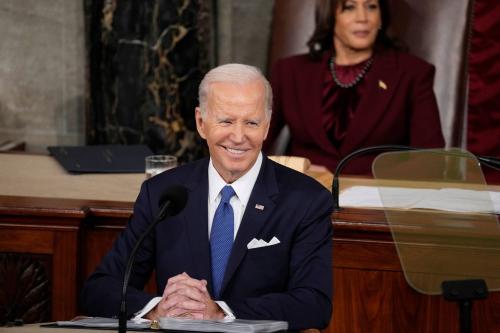On Wednesday, February 1, Audrey Singer took your questions on the country’s immigration trends and their potential to impact the 2012 election during a live web chat moderated by POLITICO.
12:32 Emily Howell: Hi everyone, let’s get started.
12:33 Comment From Pam: What is happening with the immigrant vote nationwide? Are Hispanics the biggest group of new voters? Are there other important blocs of immigrant votes?
12:35 Audrey Singer: Hello everyone. Thanks for joining. Regarding the immigrant vote nationwide, it is important to note that this is not a monolithic group by any means. U.S. immigrants are from all over the world, have different demographic profiles and live across U.S. states and metropolitan areas.
12:37 Audrey Singer: Latinos are the largest minority group in the United States and they include both foreign-born people (immigrants) and those born in the United States. They currently make up 17% of the U.S. population and are the fastest growing group. They are clearly the key to winning the election in several states: Florida, Nevada, Colorado, California, New Jersey, New Mexico and North Carolina.
12:39 Audrey Singer: In general, immigrants have recently tended to vote Democratic, but there is wide variation among source countries and within places in the United States.
12:39 Comment From Abigail: What impact did immigration have on the Florida primary?
12:41 Audrey Singer: Florida is a good example of how the composition of immigrants and Latinos in a certain geography played out. There the Latino population is dominated by Cubans with a history of more conservative politics and strong Republican support. They went for Romney due to key endorsements from within that community. Many stressed that immigration was a less-central issue for this election than the economy. Younger Cubans in Florida and elsewhere may have a different take in the general election.
12:41 Comment From Maureen: How does this break down by region? Where are the strongest Hispanic areas, and are they mostly in the southern states?
12:44 Audrey Singer: Historically the Southwest has been the largest settlement area for immigrants from Latin America, particularly Mexico. In the past 15 years or so, the fastest growth has been outside those areas in states such as NC, SC, GA, TN, etc. Also surprising is fast growth (but smaller numbers) in places such as AL, AK, KY, MS and SD.
12:45 Audrey Singer: Not all of these immigrants are going to be voting in the next election, but future growth, including the next generation, will start to have an impact on electoral politics.
12:46 Comment From Marie: What is the impact of the anti-immigrant rhetoric surrounding the right in regards to the immigrant vote, and what will the eventual GOP nominee need to do to secure this vote while appeasing conservative views of stricter immigration policy?
12:49 Audrey Singer: The impact of anti-immigrant rhetoric cuts several ways. For this primary election, the goal of the candidates seems to be who is “tougher” on illegal immigration, from Gingrich’s claim about shutting down illegal crossings at the border to Romney’s lack of support for the Dream Act. Each has altered their position slightly for each of the primaries. Who knows where they will end up to secure the nomination.
12:51 Audrey Singer: However, that will also depend on Obama’s stance. In his State of the Union speech, he was clear about supporting the Dream Act, opening doors for high-skilled immigrants and he tied everything together calling for “no more excuses on comprehensive immigration reform.” He backed this up by pointing out he has been tough on enforcement—more deportations than ever before.
12:51 Comment From Jordan: What do you think is the biggest misconception about the politics or importance of the Hispanic voting bloc?
12:52 Audrey Singer: This bloc is not necessarily for a single issue and looks like the rest of the electorate in putting jobs and the economy first.
12:53 Comment From Bertrand: Why should we provide multilingual ballots? In California, they provide them in Spanish, Korean, even Tagalog. Shouldn’t everyone be required to read English in order to vote?
12:55 Audrey Singer: Great question—most immigrants are eager to learn English and in surveys say it is the most important thing to their success and the success of their children. State and local governments who understand their residents know this and try to reach out to immigrants because they see their future in this population. Being pragmatic about bringing this population forward is what places like CA, NYC and Chicago have been doing for decades.
12:56 Comment From Jennifer S: I’ve heard that soon the U.S. will be “majority minority,” which is a pretty silly phrase. When will that happen, and will that mean voters will be majority minority, too? Or will there be a lag?
1:01 Audrey Singer: Nationwide we are projected to be majority minority in 2042, but several states already are: HI, CA, NM and TX as well as DC. The child population, though, will become majority minority by 2023 and already is in 11 states and many metros and counties. This is our future and elections will obviously depend on these voters, and that is why the GOP has moved in the direction of trying to capture that vote. Most importantly, ensuring that these up-and-coming generations are educated and experiencing economic mobility is important for the well-being of the nation, not just for getting the vote.
1:02 Emily Howell: Thanks for the questions everyone!



Commentary
Web Chat: Immigration and the 2012 Election
February 1, 2012